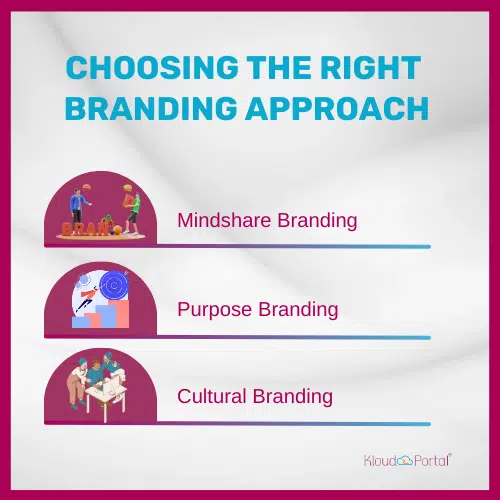What We Cover In This Blog?
Mindshare Branding
Mindshare branding focuses on capturing consumers’ attention and occupying a prominent place in their minds. It revolves around marketing tactics that aim to achieve top-of-mind awareness. Key principles of Mindshare branding include:
- Brand Recognition: Creating a brand identity that stands out and is easily recognizable in the market.
- Consistent Advertising Campaigns: Maintaining a consistent presence in various media channels to reinforce brand awareness.
- Consumer Engagement: Actively engaging with consumers through advertising, promotions, and online interactions.
- Emotional Connection: Using emotional appeals in advertising to form a deeper connection with consumers.
Impact on Consumer Perceptions and Behavior:
Mindshare branding has a significant impact on consumer perceptions and behavior:
- Consumers are more likely to consider and choose a brand they recognize and recall easily.
- Effective mindshare branding can create a sense of trust and familiarity, encouraging repeat purchases.
- It can also influence impulse buying decisions when consumers encounter the brand in-store or online.
When and Why to Choose Mindshare Branding:
Mindshare branding suits companies operating in highly competitive markets where brand recognition is a significant differentiator. It should be chosen when:
- A company wants to establish itself as a market leader.
- There’s a need to maintain a strong online presence.
- Emotional appeals influence the target audience.
Digital Marketing Services encompass online strategies and tactics to promote products or services through various digital channels, such as social media, search engines, and email marketing.
Purpose Branding
Purpose branding revolves around a brand’s commitment to a higher mission or cause beyond profit. It emphasizes the company’s values and contribution to social or environmental issues. Key principles of Purpose branding include:
- Social Consciousness: Demonstrating a genuine concern for societal or environmental issues.
- Authenticity: Ensuring the brand’s purpose aligns with its actions and values.
- Consumer Values: Connecting with consumers who share similar values and concerns.
- Brand Perception: Shaping how the brand is perceived by highlighting its purpose-driven initiatives.
Brand Building is a strategic process that involves creating a strong and recognizable identity for a company or product in the market.
Impact on Consumer Perceptions and Behavior:
Purpose branding has a profound impact on consumer perceptions and their behaviors:
- It can create a loyal customer base among those who resonate with the brand’s Purpose.
- Consumers may be willing to pay a premium for products or services from purpose-driven brands.
- Purpose branding can foster a sense of trust and authenticity, leading to increased brand loyalty.
When and Why to Choose Purpose Branding:
Purpose branding suits companies that want to impact society or the environment positively. It should be chosen when:
- The brand has a genuine commitment to a social or environmental cause.
- The target audience values corporate social responsibility and ethics.
- The brand wants to differentiate itself in a crowded market through its purpose.

Cultural Branding
Cultural branding involves embedding a brand within the cultural context of its target audience. It aims to become a part of consumers’ lifestyles and values. Key principles of Cultural branding include:
- Storytelling: Crafting narratives that resonate with the cultural narratives and aspirations of the audience.
- Market Positioning: Positioning the brand as an integral part of the target culture.
- Consumer Psychology: Understanding the cultural nuances that impact consumer behavior.
- Emotional Connection: Building emotional ties through cultural symbolism and references.
Impact on Consumer Perceptions and Behavior:
Cultural branding has a substantial impact on consumers:
- It can lead to strong brand loyalty among consumers who identify with the brand culturally.
- Consumers are likelier to choose brands that align with their cultural identity and values.
- Cultural branding can result in long-term brand recognition and resonance within a specific community or culture.
When and Why to Choose Cultural Branding:
Cultural branding suits companies that want to immerse themselves in specific cultural contexts. It should be chosen when:
- The brand aims to connect deeply with a particular cultural segment of the market.
- The target audience’s cultural identity is a significant factor in purchasing decisions.
- The brand seeks to become a cultural icon within a particular community.
An Enterprise SEO Agency specializes in optimizing websites and digital content on a large scale, ensuring high visibility and improved search engine rankings for businesses and organizations.
Choosing the Right Branding Approach
The choice of branding approach depends on various factors, including the company’s mission, target audience, and competitive landscape. Here are some considerations:
- Mindshare branding is suitable when a company wants to establish strong brand recognition, especially in highly competitive markets.
- Purpose branding is ideal for companies with genuine commitments to social or environmental causes and when targeting consumers who prioritize ethical and purpose-driven brands.
- Cultural branding is a good choice when a brand seeks to deeply embed itself within a specific cultural context and build strong connections with culturally identified audiences.
Metrics and Case Studies
1. Mindshare Branding:
- Brand recall rates.
- Website traffic and online visibility.
- Social media engagement and mentions.
Case Study: Coca-Cola’s consistent advertising and emotionally resonant campaigns have maintained its position as a globally recognized brand.
2. Purpose Branding:
- Customer loyalty and repeat purchases.
- Social media sentiment and engagement.
- Sustainability impact and corporate social responsibility (CSR) metrics.
Case Study: Patagonia’s commitment to environmental sustainability and its “Don’t Buy This Jacket” campaign showcases the effectiveness of purpose branding.
3. Cultural Branding:
- Market share within specific cultural segments.
- Cultural relevance and resonance.
- Engagement within culturally connected communities.
Case Study: Nike’s “Just Do It” campaign has become a cultural phenomenon among athletes and fitness enthusiasts, illustrating the power of cultural branding.
In the ever-evolving world of branding, companies must carefully consider their approach to connect with consumers effectively. Hyderabad’s best online reputation management services specialize in enhancing and maintaining the positive image of businesses and individuals online.
Conclusion
Mindshare, Purpose, and Cultural branding each offer unique strategies to achieve brand recognition, resonate with consumer values, or become deeply ingrained in a specific culture. The branding approach should align with a company’s mission, values, and target audience and be supported by appropriate metrics to measure its effectiveness. By understanding these branding approaches and their principles, companies can make informed decisions to create lasting emotional connections with consumers, foster brand loyalty, and achieve success in the marketplace.

Rasmita Patro
About The Author…
Meet Rasmita Patro, a content writer, a former teacher, and a former HR with a passion for storytelling, creating compelling content that engages and informs readers. She has a Master’s in Economics and an MBA degree in Human Resources. Her expertise spans a variety of industries, including finance, healthcare, technology, and others. She has a particular inclination toward crafting blog posts, articles, and social media content that resonates with the target audience. She loves reading different genres of books, love to experiment with cooking, and listening to soothing music.

